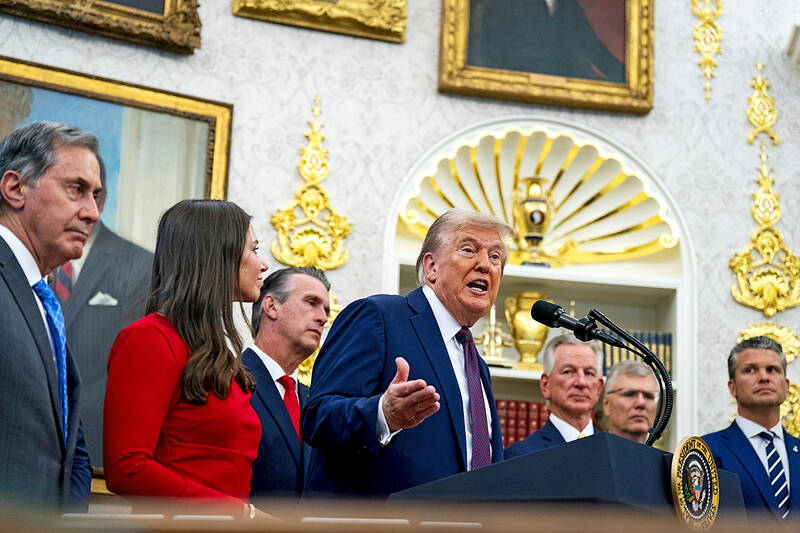US President Donald Trump’s administration is pursuing deals across up to 30 industries, involving dozens of companies deemed critical to national or economic security, according to more than a half dozen people familiar with the talks.
In some cases, the administration is offering tariff relief in exchange for concessions, revenue guarantees, or taking equity stakes in troubled companies, among other types of help. The fast-paced dealmaking is designed to deliver political wins for Trump before next year’s midterm elections, the sources said.
On Tuesday, Trump announced a deal with Pfizer Inc CEO Albert Bourla to cut drug prices in exchange for relief from planned tariffs on imported pharmaceuticals.

Photo: EPA
“The United States is done subsidizing healthcare of the rest of the world,” Trump said at an event in the Oval Office.
Just as important as the deals themselves is the optics — they must be announced from the White House, two sources said.
Eli Lilly and Co learned this the hard way when it excluded Trump from its announcement of two new manufacturing sites last month and got a call from the administration asking why they did not allow the president to announce it himself.
A spokesperson for Eli Lilly said it had not been asked to increase insulin production and that it takes “pride in regularly inviting White House officials to our announcements.”
The White House declined to comment on Eli Lilly’s announcement or on specific details of the administration’s plans.
It is all part of what White House spokesman Kush Desai has described as a “whole-of-government approach” to dealmaking “to safeguard our national and economic security.”
The plan is to use the broad powers of government to push companies to further Trump’s goal of moving manufacturing to the US, reducing dependence on China, strengthening supply chains for critical products and contributing to the government’s coffers, according to six people familiar with the discussions.
Administration outreach has touched disparate corners of the economy, including semiconductors, artificial intelligence, quantum computing, critical minerals, ship building, energy, battery production, pharmaceuticals and freight, the sources said.
Taken together, the planned interventions in the US economy reverse decades of hands-off approach to private enterprise.
“It’s amazing that a Republican administration is taking us farther away from traditional capitalism than any other Democratic administration,” said John Coffee, professor of corporate law at Columbia University in New York.
The Trump administration is looking to a little-known federal agency, the International Development Finance Corp, to play a major role in overseeing and financing the plan, two of the people said.
Established in Trump’s first term with the BUILD Act of 2018, the agency was meant to provide low-cost financing for food, health and other projects in developing nations.
A proposal sent to US Congress in June would significantly expand its authority and reach. The bill would more than quadruple its financing power to US$250 billion from US$60 billion, as well as establish an equity fund tasked with shoring up key sectors, including infrastructure, energy, critical and rare earth minerals, and supply chains — pretty much anything “in the economic and national security interests of the United States,” according to a copy of the plan reviewed by Reuters.

Jensen Huang (黃仁勳), founder and CEO of US-based artificial intelligence chip designer Nvidia Corp and Taiwan Semiconductor Manufacturing Co (TSMC, 台積電) on Friday celebrated the first Nvidia Blackwell wafer produced on US soil. Huang visited TSMC’s advanced wafer fab in the US state of Arizona and joined the Taiwanese chipmaker’s executives to witness the efforts to “build the infrastructure that powers the world’s AI factories, right here in America,” Nvidia said in a statement. At the event, Huang joined Y.L. Wang (王英郎), vice president of operations at TSMC, in signing their names on the Blackwell wafer to

AI BOOST: Although Taiwan’s reliance on Chinese rare earth elements is limited, it could face indirect impacts from supply issues and price volatility, an economist said DBS Bank Ltd (星展銀行) has sharply raised its forecast for Taiwan’s economic growth this year to 5.6 percent, citing stronger-than-expected exports and investment linked to artificial intelligence (AI), as it said that the current momentum could peak soon. The acceleration of the global AI race has fueled a surge in Taiwan’s AI-related capital spending and exports of information and communications technology (ICT) products, which have been key drivers of growth this year. “We have revised our GDP forecast for Taiwan upward to 5.6 percent from 4 percent, an upgrade that mainly reflects stronger-than-expected AI-related exports and investment in the third

RARE EARTHS: The call between the US Treasury Secretary and his Chinese counterpart came as Washington sought to rally G7 partners in response to China’s export controls China and the US on Saturday agreed to conduct another round of trade negotiations in the coming week, as the world’s two biggest economies seek to avoid another damaging tit-for-tat tariff battle. Beijing last week announced sweeping controls on the critical rare earths industry, prompting US President Donald Trump to threaten 100 percent tariffs on imports from China in retaliation. Trump had also threatened to cancel his expected meeting with Chinese President Xi Jinping (習近平) in South Korea later this month on the sidelines of the APEC summit. In the latest indication of efforts to resolve their dispute, Chinese state media reported that

CHINESE EXPORT CURBS: A dispute between China and the Netherlands could halt chip supply, affecting vehicle production, US and European auto associations said Groups representing major automakers late on Thursday warned that a chip disruption stemming from a dispute between China and the Dutch government could quickly affect US auto production. Automakers and their suppliers received notice from chipmaker Nexperia (安世半導體) last week that it could no longer guarantee delivery of its chips, the European Automobile Manufacturers Association said, adding that manufacturing could be significantly disrupted. In the US, the Alliance for Automotive Innovation, which represents General Motors, Toyota, Ford, Volkswagen, Hyundai and nearly all other major automakers, urged a quick resolution. “If the shipment of automotive chips doesn’t resume — quickly — it’s going to